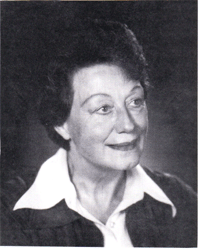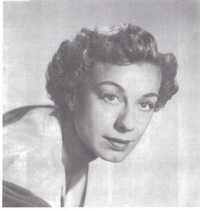Canadian Theatre Encyclopedia
Davies, Dorothy

Vancouver actor, born Dorothy Lilian Snider in July 26, 1920, Salt Lake City Utah; died March. 27, 2002, Victoria, British Columbia.
One of the earliest truly professional actors on the Vancouver stage, Dorothy Davies' list of awards is longer than some performers' resumes; her name will also be tied to one of the darker moments in Canadian entertainment history.

Dorothy's family moved to Victoria from the United States when she was a very young child. Her father was a Methodist (later United) Minister, and her mother was a piano teacher, trained at Toronto's Royal Conservatory. At the age of 18, Dorothy received a Licentiateship in Speech Arts and Drama from Trinity College of Music, London. Ten years later, she was named a Fellow of that College. Also while in her teens, she became secretary to Maj. William Bullock-Webster, superintendent of schools in British Columbia and an ardent supporter of school drama. In her position, Dorothy was instrumental in the foundation of the BC Drama Association (now Theatre BC).
After receiving acclaim in numerous roles in amateur and professional productions on Vancouver Island, Dorothy moved to Vancouver in 1947 to pursue her professional career. One of her earliest coups was to win the role of "Mary Carson" on The Carson Family, the drama serial which aired as part of CBC Radio's Farms Broadcast each day. She also joined Totem Theatre, founded by Sydney Risk, one of Vancouver's first professional theatre troupes.
Over the years, Dorothy Davies was instrumental in a number of theatrical landmarks in Vancouver. Her production of The Crucible, presented by the UBC Alumni Players, received top honours at the Dominion Drama Festival in Regina in 1955, and Dorothy herself was awarded the Louis Jouvet Challenge Trophy as Best Director.
In 1958 she directed a production of the operetta The Chocolate Soldier for a special presentation for Queen Elizabeth II and HRH The Duke of Edinburgh at Malkin Bowl. In that same year, she toured with the official play of the British Columbia Centennial, World of the Wonderful Dark, a play about the First Nations of the North-West 100 years ago by Lister Sinclair, starring Barry Morse.
When the Vancouver Playhouse opened in the early 1960s, she was a regular cast member, starring in such diverse productions as Shakespeare's Julius Caesar, Kopit's Oh Dad, Poor Dad, Mama's Hung You In The Closet And I'm Feeling So Sad, Paul St-Pierre's How To Run The Countryand Brian Friel's Philadelphia, Here I Come! Through all this, she continued on The Carsons and its successor, 51st North!, and wrote and appeared in countless radio and TV productions.
Ill health forced her to the wings for a few years in the 1970s, but appearances on The Beachcombers and a comeback at the Playhouse (Tales From The Vienna Woods, You Can't Take It With You), and the Arts Club Theatre (Agnes of God) put her back in front of audiences. Her last stage appearance was in The Gin Game in 1986.
Dorothy Davies was the first recipient of a Jessie Richardson Award for lifetime achievement, and of the Sam Payne Award (for outstanding contribution to development of young talent). She received a BC ACTRA award for her portrayal of Emily Carr on CBC Radio. She also wrote the libretto for Jean Coulthard's suite The Pines of Emily Carr 1969. In 1995 she was one of the first inductees on "Starwalk", the BC Entertainment Hall of Fame.
Yet she is probably remembered primarily in connection with an incident which put Vancouver on the entertainment map at the time. In the early 1950s, Totem Theatre had morphed into Everyman Players, working out of the Avon (formerly Pantages) Theatre on Hastings Street, hiring a "major Hollywood star" to headline each production, supported by the locally available talent. In 1953, with Everyman in tough financial times, Sydney Risk decided to take a major gamble: the "star attraction" would be the hit Broadway play, Tobacco Road, with an all-local cast. Dorothy Davies was asked to direct the show, and did so despite a threat of arrest for "offending public morality." The production opened to a packed house, but the cast was arrested following the performance. In the trial which followed, all were acquitted, with Dorothy playing a starring role on the witness stand.
In 1988, Dorothy and her husband moved to Victoria, where she produced a CD of nonsense poems called "The Other Day ...", performed by herself, with musical settings by Amanda Lince.
Profile by Drew Snider
Last updated 2020-06-08

